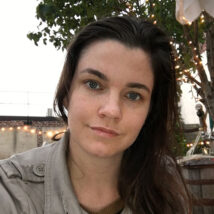
Katie Grace Carpenter
Katie Grace Carpenter is a science writer and curriculum developer, with degrees in biology and biogeochemistry. She also writes science fiction and creates science videos. Katie lives in the U.S. but also spends time in Sweden with her husband, who’s a chef.

All Stories by Katie Grace Carpenter
-
 Animals
AnimalsScientists Say: Caecilian
Some of these amphibians can produce a milk-like liquid for their offspring and give birth to live young. And those aren't the only rules these rebels break.
-
 Math
MathScientists Say: Dimension
The simple concept of dimensions has inspired sci-fi creators to wrinkle time and launch into hyperspace.
-
 Chemistry
ChemistryScientists Say: Absorb and Adsorb
These words sound and look a lot alike. But crucial differences lie in how they soak up that spill.
-
 Artificial Intelligence
Artificial IntelligenceScientists Say: Large language model
Large language models, or LLMs, are language-processing systems that underpin advanced AI technologies such as ChatGPT.
-
 Earth
EarthScientists Say: Avulsion
As rivers seek out easier routes to the sea, path reroutes can transform our world. This is ‘avulsion’ refers to in geology. In medicine, the word can describe injuries.
-
 Life
LifeScientists Say: Chimera
What does it mean to be an individual? The genetic mashups called chimeras might challenge your assumptions.
-
 Planets
PlanetsScientists Say: Regolith
This sandlike dust blankets planets, asteroids and other rocky surfaces of our solar system, including our own planet.
-
 Brain
BrainScientists Say: Aphantasia
Not everyone has a “mind’s eye,” and that’s OK. Some people recall memories and process information in different ways altogether.
-
 Brain
BrainScientists Say: Dopamine
This brain chemical helps focus our attention and plan our path toward success.
-
 Life
LifeScientists Say: Organoid
Lab-grown organ models mimic the functions of real organs and may open doors to a future of personalized medical care.
-

-
 Planets
PlanetsScientists Say: Theia
Clues about this ancient protoplanet's catastrophic end may have been entombed in Earth's lower mantle for billions of years.